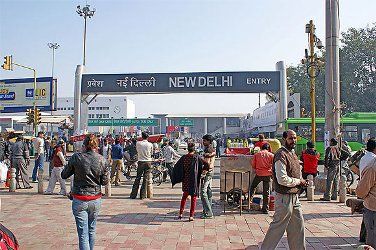 | « Back to article | Print this article |
The key task before Mr Modi is to have a railway minister who can bring about a culture change in the organisation, so that it can successfully venture out into new forms of management.
 The idea of modernising and running India’s large railway stations in the public-private-partnership mode has been dusted and taken off the shelf.
The idea of modernising and running India’s large railway stations in the public-private-partnership mode has been dusted and taken off the shelf.
The prime minister has announced that this will be done initially in around a dozen stations, with trains running below and the space above developed as commercial property.
The idea of modernising railway stations under a PPP arrangement was aired several years ago by the then railway minister, Lalu Prasad Yadav, who visualised attracting Rs 15,000 crore (Rs 150 billion) investment in 22 stations.
A beginning was made in seeking to transform New Delhi Railway Station for the Commonwealth Games in 2010.
But this was a non-starter as the Planning Commission and the railways could not agree on a model concession agreement for such projects.
Now, with a more powerful prime minister, Narendra Modi, at the helm and the Planning Commission out of the way, it is quite likely that prominent Indian railway stations will be put under the PPP mode.
Running railway stations or owning rolling stock like wagons and even entire trains is not the core operation of the railways, which is to maintain tracks and signalling and run trains.
So it is entirely logical that the prime real estate that every station represents be leveraged to unlock capital and build valuable commercial space and business.
But the more important issues are how this should be done and whether the railways in their present condition are capable of doing a good job of it.
Their experience in bringing in private partners has been at best mixed.
As there are no private competitors in the railway business and railway services are a utility, it is critical to get the regulatory framework right.
Catering on long-distance trains, for example, has been outsourced with negative results. Quality initially jumped but thereafter declined, indicating that the railways are neither very efficient nor sufficiently free of corruption to do a good job of monitoring private delivery.
The key task before Mr Modi is to have a railways minister who can bring about a culture change in the organisation, so that it can successfully venture out into new forms of management.
He has already made a false start, and the railways minister has had to be changed.
In the process, a crucial six months have been lost.
Hopefully the new minister, Suresh Prabhu, who comes with a reputation for both efficiency and integrity, will be able to deliver.
For private development and management of railway stations to succeed, the concession agreement has to get the pricing right, so that the operator can earn a decent return without overcharging passengers and incentives to improve efficiency.
It is also critical to lay down minimum standards of service and ensure that they are maintained.
There should be penalty for failing to make the mark and provision to get rid of a non-performer and bring in a new partner.
None of this is rocket science, but the bureaucracy in the railways has to do much to get it right.
Image: New Delhi Railway Station. Photograph: Courtesy, Bruno Corpet/Wikimedia Commons
The image is used for representational purpose only